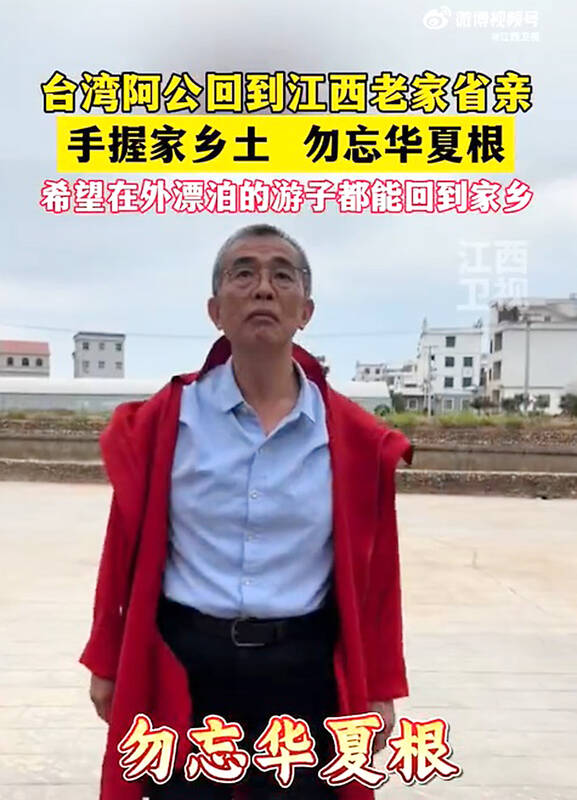Influencer Wang Wen-jui (王文瑞), known online as “Taiwan Grandpa” (台灣阿公), is a model for online “united front” propaganda, targeting central and southern Taiwan, as well as poorer and middle-class groups, National Cheng Kung University professor of political science Hung Chin-fu (洪敬富) said yesterday.
YouTuber “Pa Chiung” (八炯) on Friday released a video in which he said that Wang makes about 200,000 yuan (US$27,570) a month.
Wang, a Taipei native in his 60s, has gained a large following on Chinese social media and is known for collaborating with “Taiwan Cousin” (台灣表妹), another influencer.

Photo: Screen grab from social media
Wang has made a video saying that Ganzhou, Jiangxi, is his ancestral home and the starting point of the Long March.
“My roots are in this red land. I feel truly proud holding my hometown’s soil and never forgetting my Chinese roots,” he said.
Wang often collaborates with young Chinese influencers, once posting a video in which he was taken to an extravagant wedding banquet in China.
“I have never seen a wedding banquet like this in Taiwan, this is so extravagant,” he said in the video.
Tracing his roots and paying tribute to his ancestors is his life’s greatest wish, Wang said in an interview with Macau Satellite TV at the Straits Forum in June.
“You would benefit from visiting China because the motherland is great, even for young people,” he said. “You might even grow roots and thrive here.”
As “Taiwan Grandpa,” Wang said he hopes to contribute in whatever way he can to cross-strait exchanges.
Even though younger influencers are more popular in Taiwan, Wang’s content shows that China aims to comprehensively target all age groups and social classes in Taiwan, Hung said yesterday.
China’s “united front” strategies target small and medium-sized enterprises, middle to low-income groups, central and southern Taiwan, and young people, he said.
“Taiwan Grandpa” is meant to target central and southern Taiwan and “lower-class” people, he said.
Wang’s content is effective internal propaganda, as it portrays a struggling elderly Taiwanese moving to China and experiencing the “superiority” of China’s infrastructure and society, Hung said.
Wang’s videos might also resonate with some elderly or disheartened people in Taiwan, he said.
China’s “united front” strategies are creating a narrative in which Taiwanese of all ages and social classes can find opportunity in the “motherland,” he said.
“Taiwan Grandpa” is an example of this strategy, he added.

Taiwan has received more than US$70 million in royalties as of the end of last year from developing the F-16V jet as countries worldwide purchase or upgrade to this popular model, government and military officials said on Saturday. Taiwan funded the development of the F-16V jet and ended up the sole investor as other countries withdrew from the program. Now the F-16V is increasingly popular and countries must pay Taiwan a percentage in royalties when they purchase new F-16V aircraft or upgrade older F-16 models. The next five years are expected to be the peak for these royalties, with Taiwan potentially earning

POSITIVE DEVELOPMENT: Japan and the US are expected to hold in-depth discussions on Taiwan-related issues during the meeting next month, Japanese sources said The holding of a Japan-US leaders’ meeting ahead of US President Donald Trump’s visit to China is positive news for Taiwan, former Japan-Taiwan Exchange Association representative Hiroyasu Izumi said yesterday. After the Liberal Democratic Party’s landslide victory in Japan’s House of Representatives election, Japanese Prime Minister Sanae Takaichi is scheduled to visit the US next month, where she is to meet with Trump ahead of the US president’s planned visit to China from March 31 to April 2 for a meeting with Chinese President Xi Jinping (習近平). Japan and the US are expected to hold in-depth discussions on Taiwan-related issues during the

‘LIKE-MINDED PARTNER’: Tako van Popta said it would be inappropriate to delay signing the deal with Taiwan because of China, adding he would promote the issue Canadian senators have stressed Taiwan’s importance for international trade and expressed enthusiasm for ensuring the Taiwan-Canada trade cooperation framework agreement is implemented this year. Representative to Canada Harry Tseng (曾厚仁) in an interview with the Central News Agency (CNA) said he was increasingly uneasy about Ottawa’s delays in signing the agreement, especially as Ottawa has warmed toward Beijing. There are “no negotiations left. Not only [is it] initialed, we have three versions of the text ready: English, French and Mandarin,” Tseng said. “That tells you how close we are to the final signature.” Tseng said that he hoped Canadian Prime Minister Mark Carney

STAY IN YOUR LANE: As the US and Israel attack Iran, the ministry has warned China not to overstep by including Taiwanese citizens in its evacuation orders The Ministry of Foreign Affairs (MOFA) yesterday rebuked a statement by China’s embassy in Israel that it would evacuate Taiwanese holders of Chinese travel documents from Israel amid the latter’s escalating conflict with Iran. Tensions have risen across the Middle East in the wake of US and Israeli airstrikes on Iran beginning Saturday. China subsequently issued an evacuation notice for its citizens. In a news release, the Chinese embassy in Israel said holders of “Taiwan compatriot permits (台胞證)” issued to Taiwanese nationals by Chinese authorities for travel to China — could register for evacuation to Egypt. In Taipei, the ministry yesterday said Taiwan